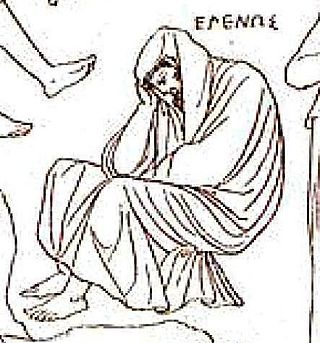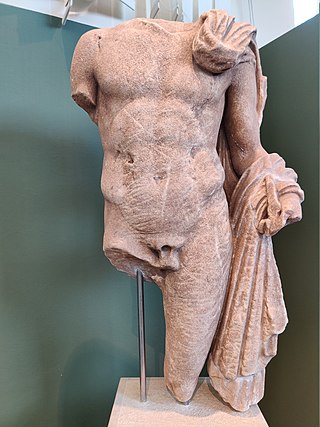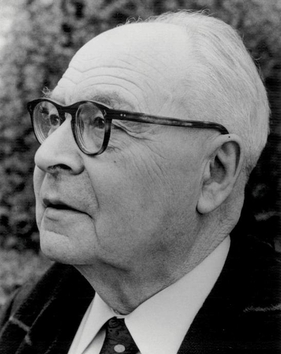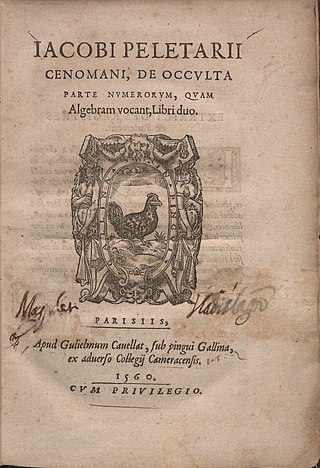Related Research Articles

In Greco-Roman mythology, Aeneas was a Trojan hero, the son of the Trojan prince Anchises and the Greek goddess Aphrodite. His father was a first cousin of King Priam of Troy, making Aeneas a second cousin to Priam's children. He is a minor character in Greek mythology and is mentioned in Homer's Iliad. Aeneas receives full treatment in Roman mythology, most extensively in Virgil's Aeneid, where he is cast as an ancestor of Romulus and Remus. He became the first true hero of Rome. Snorri Sturluson identifies him with the Norse god Víðarr of the Æsir.

In Greek mythology, Helenus was a gentle and clever seer. He was also a Trojan prince as the son of King Priam and Queen Hecuba of Troy, and the twin brother of the prophetess Cassandra. He was also called Scamandrios, and was a lover of Apollo.

In Greek mythology, Machaon was a son of Asclepius; and the older brother of Podalirius. He and his brother led an army from Tricca in the Trojan War on the side of the Greeks.

PubliusVegetius Renatus, known as Vegetius, was a writer of the Later Roman Empire. Nothing is known of his life or station beyond what is contained in his two surviving works: Epitoma rei militaris, and the lesser-known Digesta Artis Mulomedicinae, a guide to veterinary medicine. He identifies himself in the opening of his work Epitoma rei militaris as a Christian.

Jacques Auguste de Thou (Thuanus) was a French historian, book collector and president of the Parliament of Paris.

Georges Edmond Raoul Dumézil was a French philologist, linguist, and religious studies scholar who specialized in comparative linguistics and mythology. He was a professor at Istanbul University, École pratique des hautes études and the Collège de France, and a member of the Académie Française. Dumézil is well known for his formulation of the trifunctional hypothesis on Proto-Indo-European mythology and society. His research has had a major influence on the fields of comparative mythology and Indo-European studies.

Marcel Paul Pagnol was a French novelist, playwright, and filmmaker. Regarded as an auteur, in 1946, he became the first filmmaker elected to the Académie française. Although his work is less fashionable than it once was, Pagnol is still generally regarded as one of France's greatest 20th-century writers and is notable for the fact that he excelled in almost every medium—memoir, novel, drama and film.

Jacques Pelletier du Mans, also spelled Peletier was a humanist, poet and mathematician of the French Renaissance.

Jacques Le Goff was a French historian and prolific author specializing in the Middle Ages, particularly the 12th and 13th centuries.
Geoffrey Gaimar, also written Geffrei or Geoffroy, was an Anglo-Norman chronicler. His contribution to medieval literature and history was as a translator from Old English to Anglo-Norman. His L'Estoire des Engleis, or History of the English People, written about 1136–1140, was a chronicle in eight-syllable rhyming couplets, running to 6,526 lines.
Anglo-Norman literature is literature composed in the Anglo-Norman language and developed during the period of 1066–1204, as the Duchy of Normandy and the Kingdom of England were united in the Anglo-Norman realm.
Dares Phrygius, according to Homer, was a Trojan priest of Hephaestus. He was supposed to have been the author of an account of the destruction of Troy, and to have lived before Homer. A work in Latin, purporting to be a translation of this, and entitled Daretis Phrygii de excidio Troiae historia, was much read in the Middle Ages, and was then ascribed to Cornelius Nepos, who is made to dedicate it to Sallust; but the language better fits a period much later than the time of Nepos.

The Alexander Romance is an account of the life and exploits of Alexander the Great. Although constructed around a historical core, the romance is mostly fictional. It was widely copied and translated, accruing various legends and fantastical elements at different stages. The original version was composed in Ancient Greek some time before 338 CE, when a Latin translation was made, although the exact date is unknown. Several late manuscripts attribute the work to Alexander's court historian Callisthenes, but Callisthenes died before Alexander and therefore could not have written a full account of his life. The unknown author is still sometimes known as Pseudo-Callisthenes.

Anglo-Norman, also known as Anglo-Norman French, was a dialect of Old Norman that was used in England and, to a lesser extent, elsewhere in Great Britain and Ireland during the Anglo-Norman period.

John Victor Tolan is a historian of religious and cultural relations between the Arab and Latin-speaking civilizations of the Middle Ages.

The former French diocese of Saintes existed from the 6th century to the French Revolution. Its bishops had their see in the cathedral of Saintes in western France, in the modern department of Charente-Maritime. After the Concordat of 1801, the diocese was abolished and its territory passed mainly to the Diocese of La Rochelle, the name of which was changed in 1862 to the present Diocese of La Rochelle and Saintes.

Hayton of Corycus was a medieval Armenian nobleman, monk and historiographer.

Servais-Théodore Pinckaers O.P. was a noted moral theologian, Roman Catholic priest, and member of the Dominican Order. He has been especially influential in the renewal of a theological and Christological approach to Christian virtue ethics.

Elucidarium is an encyclopedic work or summa about medieval Christian theology and folk belief, originally written in the late 11th century by Honorius Augustodunensis, influenced by Anselm of Canterbury and John Scotus Eriugena. It was probably complete by 1098, as the latest work by Anselm that finds mention is Cur deus homo. This suggests that it is the earliest work by Honorius, written when he was a young man. It was intended as a handbook for the lower and less educated clergy. Valerie Flint (1975) associates its compilation with the 11th-century Reform of English monasticism.
The literature of Luxembourg is little known beyond the country's borders, partly because Luxembourg authors write in one or more of the three official languages, partly because many works are specifically directed to a local readership. Furthermore, it was not until the 19th century that the literature of Luxembourg began to develop in parallel with growing awareness of the country's national identity following the Treaty of Paris (1815) and the Treaty of London (1867).
References
- Hiberno-Norman literature, Evelyn Mullally, in Settlement and Society in Medieval Ireland: Studies presented to F.X. Martin, Dublin, 1988.
- Un Texte œnologique de Jofroi de Waterford et Servais Copale, Albert Henry, Romania 107 (1): 1-37, 1986.